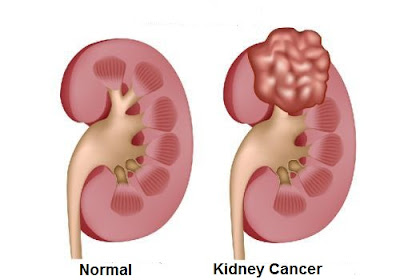What is kidney cancer?
In kidney cancer is a malignant tumor in the kidney.
There are several types of kidney cancer:
- The most common kidney tumor in adults is renal cell carcinoma. 80% of people with kidney cancer has this form. A renal cell carcinoma arises in the kidney tubules. The kidney tubules are part of the filter particles (nephrons) in the kidney.
- 10% of people with kidney cancer has a urothelial cell carcinoma. This tumor develops in the mucosa of the renal pelvis, ureters or bladder. People with this form of kidney cancer often have bladder cancer.
- Wilms tumor is a rare type of kidney cancer that occurs in young children.
What are the signs and symptoms of kidney cancer?
People with kidney cancer have the following symptoms:
- Blood splatter without it hurts.
- Lumps urinating blood, sometimes with pain in the side or in the back.
- Pain or pressure in the side.
Causes of kidney cancer
The cause of kidney cancer is unknown. It is known that some people have a greater risk of kidney cancer.
Who are more at risk?
- Smokers.
- Overweight people.
Furthermore, there are a number of rare, inherited disorders in which kidney cancer can occur. The most important are:
- The Hippel-Lindau syndrome.
- The hereditary papillary renal cell carcinoma.
Diagnosis of kidney cancer
To find out if you have kidney cancer, the doctor will first ask about your symptoms. Then the doctor will examine you. She also lets do a urine and blood test.
Depending on the results of the urine and blood tests, further investigation may be required. You will receive a referral to a specialist, usually a urologist or internist. The specialist repeats the investigations.
Often then follow investigate more. For example:
- Echo.
- CT-scan.
- MRI scan .
These are possible investigations. It is not always necessary to have all tests.
Kidney cancer is often discovered by accident. Someone then get an ultrasound or a CT scan for some other reason and the doctor discovered a tumor.
What is the treatment for kidney cancer?
The most commonly used treatments for renal cell carcinoma include:
- An operation in which the urologist kidney completely or partially removes.
- Drugs that inhibit the growth of blood vessels (angiogenesis inhibitors).
- Immunotherapy.
- Radiation (radiotherapy). Irradiation is a palliative treatment for kidney cancer: you get treatment if you can not get better, to fight pain. This usually occurs when it has spread to the bones or brains.
Kidney cancer surgery
Renal cell carcinoma, surgery is often the only treatment which can cure might be. The surgeon will remove the diseased kidney and the fatty tissue around the kidney away. Sometimes they also remove the adrenal gland and surrounding lymph nodes away.
The surgery is usually done through an incision in the abdomen, sometimes on the side of the abdomen.
In tumors that are smaller than four centimeters, the surgeon may sometimes leave a portion of the kidney. A small tumor can they take away with laparoscopy.
The physician found during the examination one metastasis, then she gets this metastasis probably get away with surgery.
With more metastases unfortunately you can not heal. The disease has already progressed too far. You will get a treatment to inhibit cancer and to combat pain (palliative treatment).
Sometimes the doctor still recommends surgery:
- Since other palliative treatments, such as immunotherapy, probably better help.
- If the tumor continues to grow into surrounding organs.
- If you often have a lot of blood and urine.
After an surgery for kidney cancer
After surgery for renal cell carcinoma will take a few days before you can eat and drink itself. This is because the intestine after surgery do not work properly. You get moisture in the meantime and nutrition through an IV. If the bowels work again and you drink enough and eat the infusion is removed. After surgery, you have pain when breathing. It's the wound. The pain disappears after a few days. After discharge from the hospital takes at least a few weeks before you have recovered.



